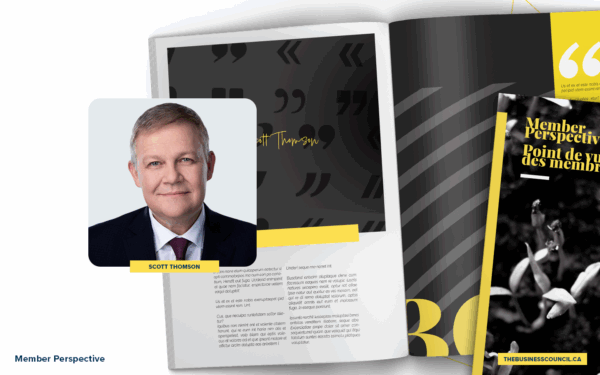Business leaders urge federal government to adopt sharper focus on competitiveness
The 2017 federal budget offers a range of promising initiatives on innovation and skills development, but says surprisingly little about the overarching need to strengthen Canada’s economic competitiveness, the Business Council of Canada says.
Overall, Finance Minister Bill Morneau’s second budget reflects a cautious, wait-and-see approach. The federal deficit is projected to rise from $23-billion in 2016-17 to $25.5-billion in 2017-18, before receding gradually over the rest of the government’s mandate. As a share of Gross Domestic Product (GDP), the federal debt is forecast to hold steady at around 31.5 per cent between now and the end of the decade.
In last year’s budget, the government promised to simplify the tax system by eliminating poorly targeted tax preferences. Budget 2017, however, proposes only a few, relatively minor changes, such as the elimination of the public transit tax credit. Minister Morneau appears to have accepted the advice of independent tax experts who urged him to hold off pending the outcome of a more wide-ranging tax reform effort in the United States.
The Honourable John Manley, President and Chief Executive Officer of the Business Council of Canada, welcomed the government’s decision to proceed cautiously on the tax front.
“Right now, the sensible approach is to wait and see what comes out of Washington,” he added. “But make no mistake: if American policymakers move to cut personal and corporate taxes, Canada must respond.”
The Business Council of Canada is the senior voice of Canada’s business community, representing 150 chief executives and leading entrepreneurs in all sectors and regions of the country. Member companies employ 1.7 million Canadians, contribute the largest share of corporate taxes, and are responsible for most of Canada’s exports, corporate philanthropy and private-sector investments in research and development.
In the Council’s pre-budget submission to Minister Morneau last December – and a subsequent letter to Prime Minister Justin Trudeau last month – Mr. Manley urged the government to adopt a laser-like focus on competitiveness as the key to generating long-term economic growth and ensuring a better life for all citizens.
Among other recommendations, he called on the government to: streamline the approval process for private-sector infrastructure projects; develop a comprehensive plan to broaden the tax base and lower rates; position Canada as a global trade and investment hub; and ensure that policies aimed at cutting greenhouse gas emissions do not disadvantage Canadian-based companies relative to their international rivals.
Mr. Manley said he was disappointed by the absence in Budget 2017 of a more focused strategy to encourage new business investment, attract international capital and enhance Canada’s ability to compete in the global economy. Also absent is any plan to balance the budget or significantly shrink the federal debt as a share of GDP.
“Like it or not, our country is facing intense competition for trade, investment, innovation and talent,” he said.
The Business Council welcomed a number of specific policy measures in the 2017 budget, including:
- New funding for work-integrated learning opportunities for post-secondary students and graduates;
- Measures to support career opportunities for women, such as new investments in early learning and child care, and to help young women entrepreneurs grow their businesses;
- The implementation of a new “Global Talent Stream” program that will facilitate faster access to top international talent for companies doing business in Canada;
- The establishment of a new national trade corridors fund that will target congestion and inefficiencies at marine ports and on busy rail and highway corridors;
- Federal support, to be provided on a competitive basis, for a small number of business-led innovation “super-clusters” in fields such as advanced manufacturing, agri-food, clean technology, digital technology, health/biosciences and clean resources, as well as infrastructure and transportation;
- $125 million to launch a Pan-Canadian Artificial Intelligence Strategy, the goal of which is to position Canada as a leading destination for companies seeking to invest in artificial intelligence; and
- $256 million over five years for Canada to join the Asian Infrastructure Investment Bank to enhance trade links, support economic growth and offer Canadian firms new commercial opportunities.











